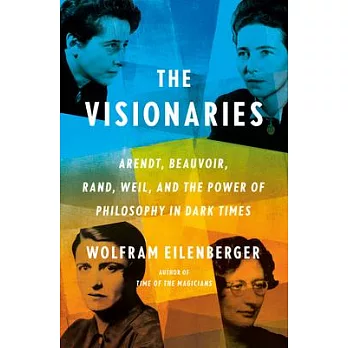1933年至1943年,可說是人類歷史上最黑暗,也是最混亂的時期。第二次世界大戰開打,人類從未料想過的殘忍手段,在各地頻傳。然而也在同一時刻,許多哲學史上重要的哲學家們,他們的人生也正迎來關鍵的十年。其中,特別有四名女哲學家,對於20世紀的哲學思維有著深遠的影響。
與居於法國哲學領導地位的沙特有著密切交流的西蒙.波娃,正為女性主義奠定基石;艾茵.蘭德作為著名作家和哲學家,她的政治觀點將大大影響20世紀,其作品《源泉》、《阿特拉斯聳聳肩》,將在未來數十年觸動無數美國人民,成為代表自由主義的重要作品;漢娜.鄂蘭正在思索自由的概念,最終將以著名的《極權主義的崛起》一作,讓她成為當代最重要政治哲學家之一;而其中最偉大的思想家,或許是西蒙.波娃的同窗-西蒙.韋伊,她在戰爭期間全力投身於幫助難民及參與各種抵抗運動,甚至在1943年拒絕領比被占領區人民更多的每日配給食物份量,最終身體因過度虛弱而逝,是眾人眼中真正的烈士。
本書精彩講述了這四位哲學家的故事,看她們在充斥專制主義與戰爭的時代,是如何奮力用自己的筆鋒和肉身,讓世界看見何謂真正的自由與開放世界。(文/博客來編譯)
"The period from 1933 to 1943 was one of the darkest and most chaotic in human history, as the Second World War unfolded with unthinkable cruelty. It was also a crucial decade in the dramatic, intersecting lives of some of history’s greatest philosophers. In particular, four women whose parallel ideas would come to dominate the twentieth century--at once in necessary dialogue and striking contrast with one another. Simone de Beauvoir ... was laying the foundations for nothing less than the future of feminism. Born Alissa Rosenbaum in St. Petersburg before emigrating to the US in 1926, Ayn Rand was honing one of the most politically influential voices of the 20th century ... Hannah Arendt was developing some of today’s most important leftwing ideas, culminating with the publication of The Origins of Totalitarianism and her arrival as a peerless intellectual celebrity. Perhaps the greatest thinker of all was a classmate of de Beauvoir: Simone Weil, who turned away from fame to devote herself entirely to refugee aid and the resistance movement during the war"--



 天天爆殺
天天爆殺  今日66折
今日66折 
























 博客來
博客來 博客來
博客來 博客來
博客來 博客來
博客來 博客來
博客來